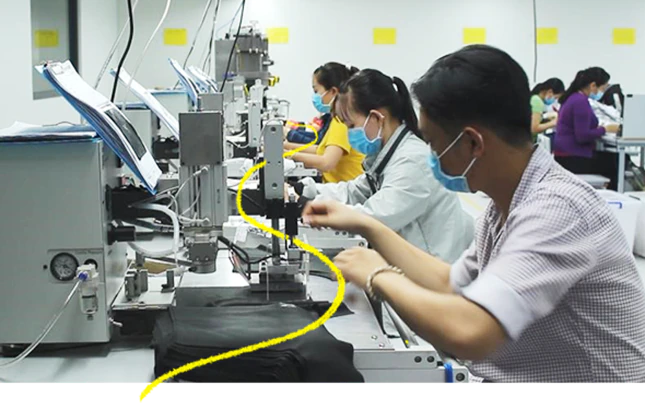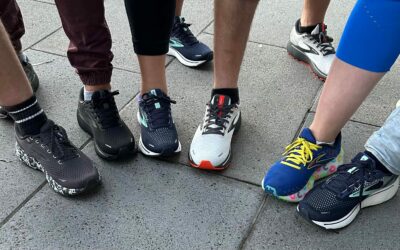A deep dive into our commitment to a sustainable supply chain and fair labor.
What does responsible sourcing mean to us?
At Brooks, we like to say that we do one thing: build great running gear. When you focus on what you do best, you do it better. And better is more than a great shoe and running experience — it means doing our part to make sure everyone who wants to run is welcome to run, and everyone who runs has a place to do it.
Responsible sourcing means we respect human rights, advance worker well-being, and ensure sustainable manufacturing.
Respect human rights
A critical first step in our responsible sourcing program is to ensure we have visibility in the factories manufacturing Brooks products and materials, none of which we own or operate, to ensure our responsible sourcing standards are upheld. We track 100% of Tier 1 (product final assembly) and Tier 2 (material manufacturing) factories and publicly disclose our global factory list, which can be found here.
To promote and sustain an ethical supply chain, we follow many international human rights standards. We ground ourselves in the Universal Declaration of Human Rights and the International Labor Organization Declaration on Fundamental Principles & Rights of Work.
We work with factories that share our values in respecting human rights and fair and safe working conditions.
Our 2025 commitments:
- Source 100% of our products and materials from manufacturing facilities that comply with our Supplier Code of Conduct and Responsible Sourcing Standards
- 90% product sourced from Tier 1 factories that achieve social compliance audit score of 90 or greater by 2025
In 2021, we expanded our annual social compliance assessment to include our high-volume Tier 2 material suppliers. We already confirm these factories comply with our Responsible Sourcing Standards during the new factory onboarding process, but their inclusion in our annual assessment process allows us to evaluate continued compliance.
The launch of an industry standardized tool called the Higg Facility Social Labor Module, or Higg FSLM, allowed us to expand the social compliance assessment deeper into our supply chain. As both a Sustainable Apparel Coalition (SAC) member and a signatory of the Social Labor Convergence Program (SLCP), we will request our Tier 2 high-volume material suppliers to annually complete the industry standardized Higg FSLM.
Following completion of a social responsibility assessment, we work closely with factories to remediate any issues identified that do not meet our standards. Factories are expected to remediate critical issues immediately and less severe issues within six months. In the spirit of continuous improvement and our commitment to establish long-term factory partnerships, when Brooks finds non-compliances, we work with the factory to understand the root cause and find a sustainable solution that will both correct the problem and prevent similar issues from occurring in the future.
In 2020, 79% of our product was sourced from factories that achieved a score of 90 or greater. This is a significant increase from previous years and can be attributed to the proactive efforts of our Responsible Sourcing team, which works with each footwear Tier 1 factory to identify opportunities to raise performance and develop long-term improvement plans.
Advance worker well-being
We believe we have an opportunity to make a difference in the lives of the people working in our manufacturing supply chain. Our approach is currently focused on directly engaging with workers on areas that are critical to worker well-being — including worker sentiment, wages, working hours, harassment and abuse, grievance mechanisms, and worker representations. We recognize that a traditional social compliance audit is not the most effective tool for fully understanding worker well-being, and so we have implemented a worker sentiment survey to directly engage with workers and provide them a platform to share their perspectives.
Our 2025 commitment:
- 100% footwear sourced from Tier 1 factories that achieve ‘Strong Performance’ in worker sentiment survey by 2025
This survey is 100% anonymous and allows us to hear from significantly more workers compared to a traditional audit. The survey results supplement the social compliance audit findings and have helped us to engage with our factory partners to develop solutions that specifically address concerns raised by the workers. In 2020, that engagement focused on work atmosphere and grievance mechanisms that were common themes raised by workers through the survey.
Part three: Sustainable manufacturing
The final piece of our responsible sourcing program aims to reduce the environmental impact associated with manufacturing Brooks product and materials.
Our 2025 commitments:
- 100% product and high-volume materials sourced from factories that achieve Higg FEM level 1 and working toward level 3
- 100% compliance with the ZDHC MRSL and zero discharge of hazardous chemicals
- 100% manufacturing assembly chemicals water-based
- Use only non-fluorinated (C0) durable water repellents and anti-wicking treatments
Our approach to achieve our sustainable manufacturing objective is to assess the environmental performance of facilities manufacturing our product and materials using the industry standardized tool, the Higg Facility Environmental Module (Higg FEM). We have been using this tool with our Tier 1 final assembly factories since 2014 and our high-volume Tier 2 material suppliers since 2019. Following the completion of this self-assessment, all factories are required to verify the accuracy of their assessment via an approved verifier.
We expect all factories to achieve Higg FEM level 1. This indicates that the factory has a good understanding of its environmental impact and is tracking its sustainability performance. Our approach to improve performance is to review each verified assessment and identify specific actions the factory will need to take to achieve the level 1 performance requirement. For those factories that are already achieving level 1, we work with them to develop an action plan toward achieving the longer-term goal of level 3 performance, which indicates the factory has implemented leading practices to reduce environmental impact.
An important focus of our sustainable manufacturing program is chemicals management. The objective of our Responsible Chemicals program is to ensure factories manufacturing Brooks product and materials use only chemicals that are safe for people and the planet. The Brooks Restricted Substances List (RSL) underpins the Responsible Chemicals program and defines those substances that we restrict or eliminate from our products. All materials in Brooks’ product must comply with our RSL. We communicate our restricted substances requirements to all our suppliers through our RSL and maintain this understanding through our Code of Conduct and RSL Compliance Agreement, which is signed by all suppliers with each updated version of our RSL.
In 2020, we continued our focus on transitioning chemicals used in footwear assembly to water-based alternatives that are safer for people and the planet. By the end of 2020, over half of footwear manufacturing assembly chemicals were water-based, up 25% since 2019. In addition, 86% of adhesives are now water-based, up from 72% in 2019, and 22% of primers are now water-based, up from 0% in 2019.




